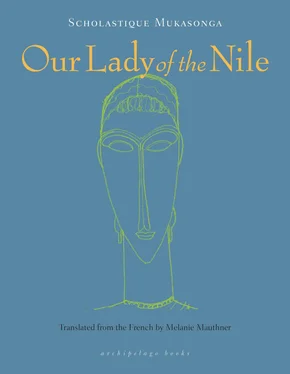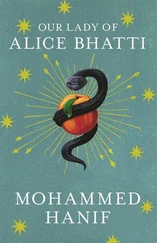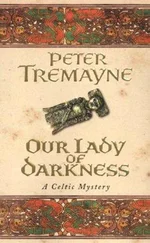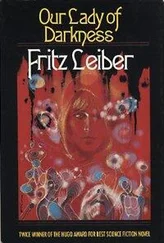“My poor Modesta,” said Goretti, “your mother is always so fussy, with her lovely white immaculate bananas, served with milk! You always take after your mother. I’ll tell you what to make for your father: dark red bananas that have soaked up the bean juice. I’m sure your mother wouldn’t touch them, but when the houseboy prepares some for your father, you’ll be obliged to try them. Teach your mother the recipe: she must peel them, and then, when the beans are almost done but the pot’s still half full of water, throw them in the pot so they absorb all the remaining liquid. The bananas will turn red, brown even, that’s what makes them thick and succulent! Bananas for true Rwandans who’ve got the strength to wield a hoe!”
“You’re all city girls,” said Virginia, “or from rich families. You’ve never eaten bananas in the fields. That’s where they’re at their best! Often when we’re working in the fields and we don’t have time to go home, we’ll light a little fire and grill a couple of bananas, not in the flames of course, but in the red-hot embers. Yet there’s something even better: when I was a little girl, my mother would sometimes give me and my girlfriends a few bananas. We’d head into the fields after the sorghum harvest and dig a small hole, then light a fire in the hole with dried banana leaves. After it died down, we’d remove the embers, but the hole would still be glowing red. So we’d line it with a fresh green banana leaf, place the bananas in the hole and cover them with the hot earth. Then you just put a banana leaf on top and sprinkle it with a little water. When the leaf is fairly dry, you open up the hole. The banana skins look like a soldier’s camouflage gear, and the inside is so tender, it just melts in your mouth! I don’t think I’ve ever eaten bananas so tasty.”
“So what did you come to the lycée for?” asked Gloriosa. “You should have stayed in the sticks munching bananas in the fields. You would have made room for a real Rwandan from the majority people.”
“Sure, I’m from the country and I’m not ashamed of it, but I am ashamed of what I just said and of what we’ve all been saying. Do Rwandans ever talk about what they eat? It’s shameful to talk about that. It’s shameful even to eat in front of others, to open your mouth in front of someone, yet that’s what we all do here every day!”
“It’s true,” said Immaculée. “Whites have no modesty. I hear them when my father invites them over to talk business. He’s got no choice. The whites never stop talking about what they eat, what they have eaten, and what they will eat.”
“And the Zairians,” Goretti said, looking at Frida, “they eat termites, crickets, snakes, and monkeys, and they’re proud of it!”
“They’ll be ringing soon for the refectory,” said Gloriosa. “Come along. And you, Virginia, you’ll have no choice but to open your mouth in front of us and eat up the leftovers of real Rwandan girls.”
The rain fell on the lycée of Our Lady of the Nile. How many days and weeks had it been? Everyone had stopped counting. Mountains and clouds were but a single grumbling chaos, as if on the first or last day of the world. The rain streamed down the face of Our Lady of the Nile, washing off her black mask. The supposed source of the Nile flooded over the edge of the basin in a raging torrent. Passersby on the path — in Rwanda there are always passersby on the path, though you never know where they’re coming from or where they’re going — took shelter beneath giant banana leaves that the thin film of water changed into green mirrors.
For many long months, rain becomes the Sovereign of Rwanda, a far greater ruler than the former King or the current President. Her coming is eagerly awaited and entreated. Famine or plenty, it’s Rain who will decide. Rain, the good omen of a fertile marriage. First rains, at the end of the dry season, making children dance as they turn their faces skyward to receive the fat drops for which they’ve longed. Shameless rain, revealing the budding curves of all young women beneath their drenched wraparounds. Violent, capricious, punctilious Mistress, pitter-pattering on every sheet-metal roof, on those sheltering in the banana groves or in the muddy neighborhoods of the capital. She who casts her net over the lake, and diminishes the volcanoes’ hugeness; she who reigns over the vast forests of the Congo, the very guts of Africa. Rain, endless Rain, unto the ocean that bore her.
“Maybe it rains like this the world over,” said Modesta, “maybe it will just keep on raining and never stop, maybe it’s Noah’s flood all over again.”
“Just imagine, girls,” said Gloriosa, “if it was the flood, we’d soon be the only ones left on Earth, the lycée’s way too high up to drown, it’d be like the Ark. We’d be alone on Earth.”
“And when the water ebbs away — because it’s bound to one day — it’d be up to us to repopulate the earth. But how will we manage if there are no boys left?” Frida said. “The white teachers would have left ages ago to drown back home, and I for one won’t have Brother Auxile or Father Herménégilde.”
“C’mon,” said Virginia. “The flood’s an abapadri tale. Where I come from, up on my hill, we abandon the fields as soon as it rains and gather around the fire. Vacation time. No need to fetch water, because we make banana-leaf gutters to catch the rain. We can shower and do our washing at home. We spend our time roasting corn as we roast our feet. But be careful, if the cob bursts and the kernels fly, that attracts lightning. And my mother says: ‘Don’t laugh, those who show their teeth, especially those with red gums, they’ll bring on lightning.’ ”
“And we have the abavubyi in Rwanda, the rainmakers,” said Veronica. “They’re the ones who control the rain, making her start or stop. But perhaps they’ve forgotten how to make her stop. Or else they’re taking revenge on the missionaries who make fun of them and denounce them to the district authorities.”
“And do you believe in those abavubyi ?”
“I’m not sure, but I know one, an old woman. I went to see her with Immaculée, she lives nearby.”
“Tell us.”
“One Sunday after Mass, Immaculée told me: ‘I want to go see Kagabo, the healer. You know, the one who sells strange medicines at the market. I’m a little scared to go see him alone. Want to come along?’ Of course I was ready to accompany Immaculée; I was curious to see what she was up to with that witch doctor the Sisters call the devil’s henchman. You know Kagabo, you see him at the market, right at the end of the row of women selling peas and firewood. A little apart, but no one bothers him; the district police officers don’t go anywhere near him, and his customers prefer no one notice them. He lays out his wares in front of him on a piece of matting; they’re pretty scary looking. I know that some people will ask me what the point is of those oddly shaped roots and all those herbs and dried leaves and the little shells that come from far away, from the sea, as well as glass beads like the necklaces our grandmothers used to wear, the skins of serval cats, snake skins and lizard skins, small hoes, arrowheads, little bells, copper-wire bracelets, powder in banana-bark packets, and who knows what else. I don’t think he has many clients. The ones who are seeking out Kagabo only pretend they’ve come to buy something; for more complicated matters, they make appointments to see him at his home, wherever that is, to heal themselves with his little jars of Nile water, to cast a spell, or be freed from one, and for even more serious things.
“We walked up to Kagabo, trembling a little. Immaculée was too afraid to address him. He eventually spotted us and beckoned. ‘What can I do for you, my belles demoiselles?’ Quickly, Immaculée whispered: ‘I need your help, Kagabo. You see, the thing is, I’ve got a suitor, in the capital. I’m scared he’ll chase after other girls, that he’ll dump me. Give me something to keep my sweetheart, so he has eyes only for me, so he doesn’t see any other girls, so there’s only one girl for him in all the world. I don’t want to see another girl on his motorbike.’ Kagabo answered: ‘I deal with sickness, I’m a healer, love problems don’t concern me. But I know someone who can help you out, and that’s Nyamirongi, the rainmaker. She’s doesn’t just deal with clouds. Give me a hundred francs and I’ll take you to see her next Sunday; you can bring your friend along, but she’ll have to pay a hundred francs too. Come when the market packs up and we’ll go to Nyamirongi’s.’
Читать дальше












